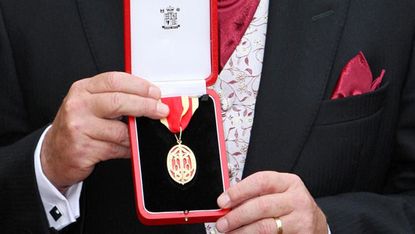Knighthoods for reshuffle rejects: it’s time to rethink honours
Maybe we should get rid of the whole honours system: the prospect of a title corrupts our public life

The news that two of the ministers sacked in this week’s reshuffle, Alan Duncan and Hugh Robertson, are to be knighted set off a splendid exchange in the House of Commons on Wednesday.
Asked whether it was appropriate that dismissed ministers should receive titles and honours as a consolation prize for their loss of office, the Prime Minister came up with one of his better putdowns: he wouldn’t take lectures on this from the party that gave a knighthood to Fred Goodwin. Quite. A dangerous one though: I assume only good taste prevented the leader of the opposition from retorting that it was the Conservatives who knighted Jimmy Savile in 1990.
The episode has once again put our honours system under the microscope. There may be perfectly good reasons why MPs should receive knighthoods, but surely not as part of a severance package from ministerial office - to keep them sweet, one assumes. It devalues the whole system.
Subscribe to The Week
Escape your echo chamber. Get the facts behind the news, plus analysis from multiple perspectives.

Sign up for The Week's Free Newsletters
From our morning news briefing to a weekly Good News Newsletter, get the best of The Week delivered directly to your inbox.
From our morning news briefing to a weekly Good News Newsletter, get the best of The Week delivered directly to your inbox.
If knighthoods corrupt, peerages corrupt absolutely. It is no secret in the intelligence community that at the time of the Iraq War at least two top spooks had the ambition to become the first heads of their services to be elevated to the House of Lords. I doubt it enhanced their judgment.
And you can buy peerages, too. Despite a year-long investigation that included interviewing the then Prime Minister Tony Blair three times (and some Yeti-sized footprints in the snow), detectives from Scotland Yard were unable to put together a convincing case that peerages had been sold for cash. Yet clearly they have been, by all the major political parties. And I suspect that people are prepared to pay for them (it’s a criminal offence) not because they want to take part in the dreary business of legislation but because they want to call themselves ‘Lord or Lady something or other’.
The principal motivation is usually social vanity rather than duty. Maybe it does get you a better table in a restaurant: one can only hope that a new generation of head waiters unimpressed by bought titles emerges soon.
The hunger for gongs has begun to infect the armed services as well. While it is entirely right that our brave servicemen and women should receive awards for gallantry and distinguished service in the field I wonder if we haven’t gone too far, particularly in the awarding of campaign medals.
Watch the haunting cine-films of Great War veterans at the Cenotaph in the 1920s: many of them wear just three medals ‘Pip, Squeak and Wilfred’ – the 1914/15 star, the British War Medal and the Allied Victory medal. Those who arrived on the Western Front in 1916 and who fought on the Somme, at Passchendaele, and in the great allied offensives of 1918 will wear only two.
Most depressingly, the one part of the honours system outside political control, appointments to the Order of the Garter (entirely in the gift of Her Majesty), is showing signs of decadence as well.
Since the war, generally, the Garter has gone to worthy recipients – a roll call of distinguished public servants and those who have rendered personal service to the Sovereign. The only controversy surrounding the order was the re-appointment in 1971 of Emperor Hirohito of Japan (he had been stripped of the honour after Pearl Harbor).
As a young officer on guard at Windsor Castle I frequently attended services in St George’s Chapel: looking up at the splendid banners of the Garter knights (five feet square) adorning the Quire, the gold chrysanthemum of the Japanese Emperor seemed out of place. That a man who narrowly escaped trial and execution as a war criminal could have anything to do with a Christian order of chivalry seemed odd. But I could understand that a good relationship between Cold War allies was important – at least the Englishmen and Welshmen appointed to the order were impressive. Sadly, no longer.
The last two Garter knights appointed earlier this year were Baroness Manningham-Buller, former head of MI5 and member of the Joint Intelligence Committee that authorised the ‘dodgy dossiers’ on Iraq. The other lucky recipient was Lord King, Governor of the Bank of England during the biggest economic meltdown since the Great Depression. A sugar-lump sized dose of moral courage by either could have done much to mitigate effects of both disasters. They epitomise the new style of public servant – self-advancement is the new duty not duty itself.
Honi soit qui mal y pense (‘Shame be to him who thinks ill of it’) as Edward III is supposed to have said on founding the order. Well, I do ‘mal y pense’. Although of course I blame the Queen’s out-of-touch advisers rather than Her Majesty herself.
Maybe it’s time to get rid of the whole honours system. The prospect of a title is a wild card that corrupts our public life. It’s just the way people are.
Some years ago I did some work for the Australian Broadcasting Corporation. Sitting in their studio in central London late at night my views on terrorism were broadcast live on breakfast news down under. They sent me a cheque made out to ‘Sir Crispin Black’ – I should have cashed it.
Instead, I had it framed.
Create an account with the same email registered to your subscription to unlock access.
Sign up for Today's Best Articles in your inbox
A free daily email with the biggest news stories of the day – and the best features from TheWeek.com
-
 The growing thirst for camel milk
The growing thirst for camel milkUnder the radar Climate change and health-conscious consumers are pushing demand for nutrient-rich product – and the growth of industrialised farming
By Harriet Marsden, The Week UK Published
-
 'Good riddance to the televised presidential debate'
'Good riddance to the televised presidential debate'Instant Opinion Opinion, comment and editorials of the day
By Harold Maass, The Week US Published
-
 Caitlin Clark the No. 1 pick in bullish WNBA Draft
Caitlin Clark the No. 1 pick in bullish WNBA DraftSpeed Read As expected, she went to the Indiana Fever
By Peter Weber, The Week US Published